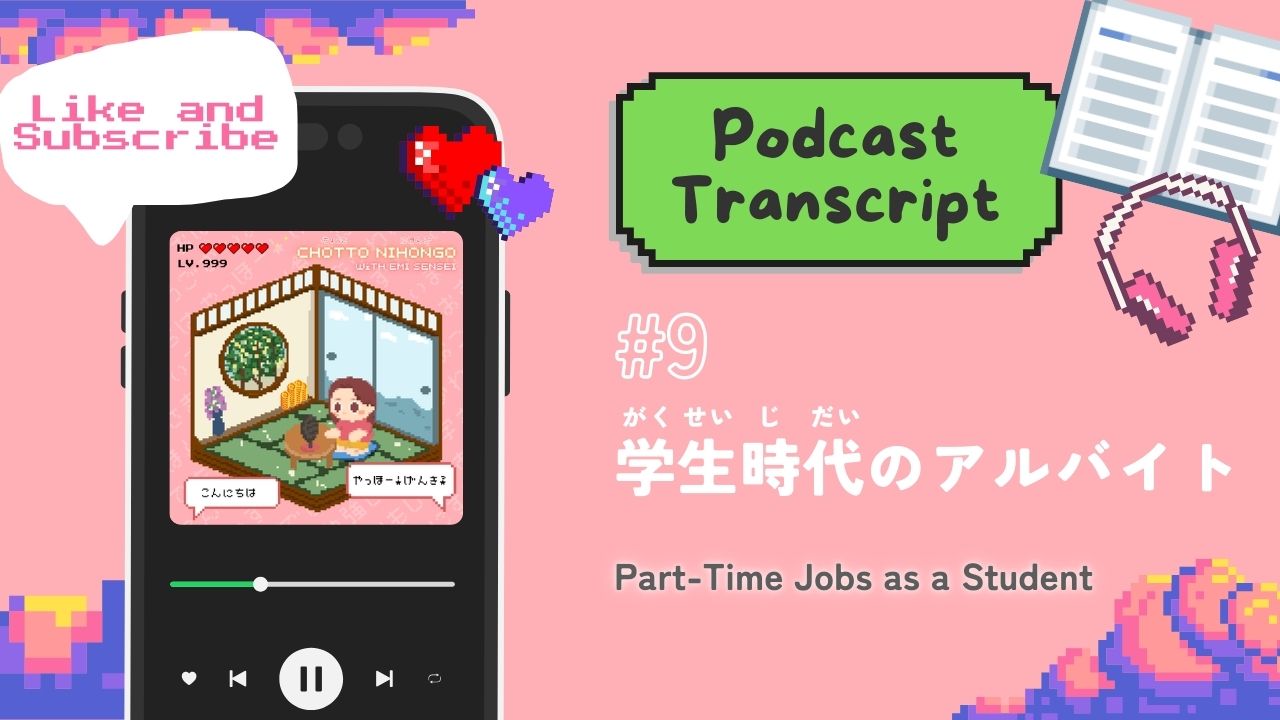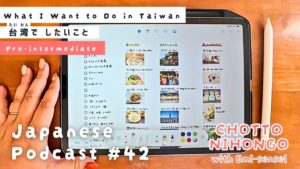おすすめの Google 拡張機能です!新しい言葉を勉強しましょう!
Here are the recommended Chrome extensions! Let’s learn new words here!
ポッドキャストプラットフォーム|Platforms of Podcast
こちらの記事は、配信中のポッドキャストのスクリプトです。
ぜひ、ポッドキャストを聞きながら読んでください。
 えみ先生
えみ先生もう聞いた人は、クイズをチェックしましょう!
ちょっとクイズ!|CHOTTO Quiz!
ポッドキャストを聞いた人は、ちょっとクイズを解いてみましょう。
むずかしいときは、下のスクリプトを読んで、もう一度クイズをチェックしてみてください。
【えいご】English Translation
Answer these quiz questions if you’ve listened to a new episode of my podcast.
If it was difficult, read the transcript below and try again.
❓ 日本では、何歳からアルバイトができますか? | At what age can you start working part-time in Japan?
16歳(高校1年生)からです。🤵
From 16 years old (Freshman at high school).🤵
❓ 「時給」は、どういう意味ですか? | What does “時給” mean?
1時間 働いて もらえる お金です。💰
It means the money you earn for one hour of work.
❓ えみ先生が 高校生の時に はじめてアルバイトをしたのは どこですか? | Where did Emi-sensei work for her first part-time job in high school?
「沖縄そば屋さん」です。沖縄そばのレストランで、はじめてアルバイトをしました。🍜
It was an “Okinawa Soba Restaurant.” I worked at the restaurant that specializes in Okinawa soba. 🍜
ポッドキャストのスクリプト|Transcript of Podcast
エピソード9、「学生時代のアルバイト」
このポッドキャストは、初中級(Pre-Intermediate)レベルです。
おはようございます。こんにちは。こんばんは。
日本語の先生、エミです。
今、ポッドキャストを録っているのは金曜日なんですけど、昨日、木曜日は飲み会がありました。
私の夫と、私の夫の会社の人と一緒に飲み会でした。
でも、居酒屋じゃなくて、 その夫の会社の上司の家で 飲み会をしました。
みんなで ご飯を作って、お酒を飲んで、いろんな話をしました。
昨日は 夜12時ぐらいまで 話をしたので、今ちょっと眠いです。まだ眠いです。
朝 起きるのが ちょっと大変でした。
でも、やらなきゃいけないことがたくさんあるので、がんばって起きました。
【えいご】English Translation
Good morning. Hello. Good afternoon.
I am a Japanese teacher, Emi.
This podcast is being recorded on a Friday, but yesterday, on Thursday, I went to a drinking party.
It was a drinking party with my husband and people from his company.
However, instead of going to an izakaya, we had the drinking party at my husband’s boss’s house.
We all cooked food together, drank alcohol, and talked about various things.
We talked until about 12 o’clock last night, so I’m a little sleepy now. I’m still sleepy.
It was a bit difficult to wake up this morning.
But I had many things I needed to do, so I tried hard and got up.
日本は、今 1月です。
2025年になりましたから、たぶん 会社で働いてる人は 新年会をするかもしれません。
新年会は だいたい 1月にありますね。
会社の人と居酒屋に行って、「今年も がんばりましょう」と言って、お酒を飲んだり、お話をしたりします。
【えいご】English Translation
t’s January in Japan now. (Well, I know it is everywhere but I said this somehow)
Since it’s 2025 now, people who work at companies might be having New Year’s parties.
New Year’s parties are usually held in January.
People from the same company go to an izakaya, say, “Let’s work hard again this year,” and drink alcohol or have conversations.
じゃあ、ここで 先週の質問をチェックしましょう。
先週は こんな質問をしました。
「みなさんはアルバイトをしたことがありますか?
どんなアルバイトをしていましたか?」
こんな質問でした。
【えいご】English Translation
Now, let’s check the question from last week.
Last week, I asked this question:
“Have you ever worked a part-time job?
What kind of part-time job did you do?”
That was the question.
はい。みなさんはアルバイトしたことありますか?
どんなアルバイトでしたか?
今日は、私の学生の時していた アルバイトを話したいと思います。
でも、まず はじめに 日本は何歳からアルバイトができますか?
わかりますか?
【えいご】English Translation
So, have you ever worked a part-time job?
What kind of job was it?
Today, I’d like to talk about the part-time jobs I did when I was a student.
But first, do you know from what age you can work a part-time job in Japan?
日本では、16歳から、高校1年生から アルバイトをすることができます。
15歳未満、15歳と もっと下の年の人は アルバイトをすることができません。
日本の法律で決まっています。
でも、16歳でも高校に行っている人は 高校のルールがあります。
高校のルールがあって、アルバイトができない学校もあります。
はい。
私が 行っていた高校も、ダメじゃないです、ダメじゃないですけど、ちゃんと「アルバイトをします。」言わなければいけませんでした。
【えいご】English Translation
In Japan, you can work a part-time job from the age of 16, which is the first year of high school.
People under 15 years old, that is, those who are 15 or younger, are not allowed to work part-time jobs.
It’s determined by Japanese law.
However, even if you’re 16, there are high school rules.
Some schools have rules that prohibit students from working part-time jobs.
At the high school I used to go, it wasn’t prohibited, but you had to properly notify the school if you wanted to work part-time.
だから 先生に、「私はアルバイトがしたいんです」と言って、 紙にアルバイトのことを たくさん書きました。
たとえば、どこでアルバイトをしますか?
誰が 会社の上司ですか?とか、
あとは いつ働きますか?週末 働きますか?学校の後に 働きますか?
そんなことを 書きました。
私は学校に話していたので、16歳からアルバイトをしていました。
【えいご】English Translation
So I told my teacher, “I want to work part-time,” and I had to write many details about the job on a form.
For example, where I would work,
who my manager was,
and when I would work—on weekends or after school?
I wrote these things on the form.
Since I informed my school, I was able to start working part-time at 16.
じゃあ、アルバイトの話をする前に、アルバイトで使う言葉をチェックしましょう。
まず 1つ目。「バイト」
これはアルバイトと同じです。アルバイトの 短い言葉です。
アルバイトは…、アルバイトも よく使います。
けど、バイトは短い言葉。簡単なので バイトのほうが よく使いますね。
【えいご】English Translation
Before talking about my part-time jobs, let’s check some vocabulary related to part-time jobs.
First, the word “バイト” (baito).
This is the same as “アルバイト” (arubaito). It’s the short form of arubaito.
Arubaito is also often used, but baito is shorter and simpler, so it’s used more frequently.
そして、「給料」
これは 働いてもらう お金のことです。
1ヶ月 働きました。その後、上司から給料をもらいます。
働いたから もらいます。
はい、これが「給料」です。
【えいご】English Translation
Next is “給料” (kyuuryou).
This refers to the money you receive for working.
After working for a month, you receive kyuuryou from your boss.
It’s the money you earn from working.
That’s “給料.”
そして、アルバイトで よく使う言葉が「時給」です。
時給は、時間の「時」に給料の「給」、2つの漢字を使います。
時給は、1時間 働いてもらえる お金です。
たとえば、「時給1000円です」という会社は、1時間 働いて 1000円もらえます。
5時間 働いたら、5000円もらえます。
ほかにも 時給と似ている言葉があります。
「日給」や「月給」という 言葉です。
「日給」は1日 働いてもらえる お金です。
「月給」は1ヶ月 働いてもらえる お金です。
でも、アルバイトの人は ほとんど 時給です。
時給のシステムを使います。
【えいご】English Translation
Another commonly used term in part-time jobs is “時給” (jikyuu).
Jikyuu combines the kanji for “time” (時) and “wage” (給).
Jikyuu means the amount of money you earn per hour.
For example, if a company pays “時給1000円” (jikyuu 1000 yen), you earn 1000 yen for one hour of work.
If you work for five hours, you earn 5000 yen.
There are also words similar to jikyuu, like “日給” (nikkyuu) and “月給” (gekkyuu).
Nikkyuu refers to the amount you earn for one day of work.
Gekkyuu refers to the amount you earn for one month of work.
However, most part-time jobs are based on the jikyuu system.
そして、次の言葉。ちょっと むずかしい言葉です。
「最低賃金」
「最低」は1番 低いという意味です。
そして、「賃金」は給料と同じ意味です。
だから、最低賃金は その場所の1番 低い お給料です。
場所によって 最低賃金は変わります。
たとえば、家賃、 家に払う お金が高いですね。
小さいアパートでも、8万円とか10万円ぐらい払います。
東京は たくさん お金を使いますから、最低賃金が ほかの場所より高いです。
【えいご】English Translation
Another important term is “最低賃金” (saitei chingin).
“最低” (saitei) means “the lowest,” and “賃金” (chingin) means “wages.”
So, saitei chingin refers to the lowest wages in a particular area.
The saitei chingin varies by location.
For instance, rent in Tokyo is high. Even for a small apartment, you might pay 80,000 or 100,000 yen.
Since living in Tokyo costs more money, the saitei chingin there is higher than in other areas.
2025年、今、今の東京の最低賃金は 1163円です。1163円。
そして、1番 最低賃金が 安いのは秋田県です。
秋田県は 日本の北にあります。秋田県の 最低賃金は 951円です。
だいたい 200円ぐらい 違いますね。
ちなみに 私の出身 沖縄の最低賃金は 952円でした。
秋田県は 951円。沖縄県は 952円。
沖縄は 秋田の次に 安いです。低い最低賃金です。
はい、これが最低賃金ですね。
【えいご】English Translation
As of 2025, the current saitei chingin in Tokyo is 1,163 yen.
The lowest saitei chingin is in Akita Prefecture, which is in northern Japan.
In Akita, it’s 951 yen.
There’s about a 200-yen difference.
Incidentally, in Okinawa, where I’m from, the saitei chingin is 952 yen.
In Akita, it’s 951 yen. Okinawa’s saitei chingin is the second-lowest in Japan.
That’s saitei chingin.
そして、最後の言葉。「シフト」
これはカタカナです。英語の”shift” と 同じ意味です。
これは働く 時間のことです。
たとえば、「今日の シフトは 8時間です」8時間 働きます。シフトです。
とか、「今日は 夜のシフトです」「朝のシフトです」という言葉を使います。はい。
【えいご】English Translation
Lastly, there’s “シフト” (shifuto).
This is written in katakana and comes from the English word “shift.”
It refers to your work hours.
For example, “今日のシフトは8時間です” (Kyou no shifuto wa hachijikan desu) means “Today’s shift is 8 hours.”
Or you might say, “今日は夜のシフトです” (Kyou wa yoru no shifuto desu), which means, “Today is a night shift.”
じゃあ、私の今までのアルバイトを 紹介します。
高校の時と 大学の時、 全部で 4つアルバイトをしてきました。
まず1つ目。
高校の時にした アルバイトですけど、沖縄そば屋さんでアルバイトをしました。
沖縄そばという食べ物、そばのレストランで 働きました。
ここは 2011年から 2015年まで 働きました。
週末と学校が 休みの時だけ 働きました。だいたい 1日 5時間ぐらい 働きましたね。
【えいご】English Translation
Today, I’d like to share about the part-time jobs I’ve had so far.
During high school and university, I worked four part-time jobs in total.
First Job: Okinawa Soba Restaurant
My first part-time job was at an Okinawa soba restaurant during high school.
I worked there from 2011 to 2015,
mainly on weekends and during school holidays, working about 5 hours a day.
そして、この おそば屋さんの時給、1時間に もらえる お金。
時給は たぶん、最初は 700円ぐらいでした。
今の最低賃金より もっと安いです。
あの時は 2011年、昔ですから、最低賃金も安かったです。
1時間 働いて 700円もらいました。でも最後は ちょっと上がりました。ちょっとだけ。
たぶん 750円ぐらいに 時給が上がったと思います。はい。
ここは、私が 初めてアルバイトをしたところです。
働いてる人、スタッフも みんな優しくて、たくさん いろんなことを 教えてくれました。
そのレストランは 沖縄の人も たくさん来るし、観光客も たくさん来ました。はい。
【えいご】English Translation
The hourly wage at this restaurant was around 700 yen when I started.
This was lower than the current minimum wage because it was back in 2011.
By the end of my time there, the hourly wage increased slightly, to about 750 yen.
This was my first-ever part-time job,
and I learned a lot from the kind and helpful staff.
The restaurant was popular with both locals and tourists, so it was always bustling with people.
そして 高校の時、あと1つアルバイトをしていました。
それが居酒屋です。
みなさん、居酒屋わかりますか?行ったことありますか?
居酒屋は、 日本の、お酒を飲んで ご飯が食べられる場所ですね。
私は 居酒屋で 2014年から 2015年くらいまで、半年ぐらい 働きました。
学校が終わってから 夕方と、あと休みの日の 夕方から夜まで働きました。だいたい 1日5時間ぐらいですね。
時給は、ちょっと覚えていないですけど、たぶん 800円ぐらいもらいました。
800円から 850円ぐらいだったと思います。
【えいご】English Translation
Second Job: Izakaya
My second job during high school was at an izakaya, a Japanese-style pub where you can drink and eat.
I worked there from 2014 to 2015 for about six months,
mainly in the evenings after school and on weekends, about 5 hours a day.
The hourly wage was around 800 to 850 yen,
although I don’t remember the exact amount.
この居酒屋は とっても忙しかったです。
あと、夜 働きますから、とっても眠かったですね。
でも、いろんな お客さんがいて、とっても楽しかったです。
そして、居酒屋のいいところ。 居酒屋は「まかない」がもらえます。
でも、もらえないところも あると思います。
けど、私が働いていた居酒屋は「まかない」がもらえました。
「まかない」知ってますか?
「まかない」は、働いているスタッフのための ご飯です。
居酒屋だったので、その まかないの ご飯が おいしかったです。
そして、この2つ、
高校生の時は、沖縄そば屋さんと 居酒屋で働きました。
【えいご】English Translation
The izakaya was very busy,
and working in the evenings made me quite sleepy,
but I enjoyed interacting with the many different customers.
One great thing about working at this izakaya was the “makanai“ meals—staff meals provided for free.
Not all izakayas offer this, but the one I worked at did, and the food was delicious.
So these two,
I worked at the Okinawa Soba restaurant and the izakaya.
その後、大学に行って 新しい場所に住んだので、ビジネスホテルで アルバイトを始めました。
2015年から 2019年まで、大学の時 4年間は ずっとこのホテルで働いていました。
学校が 終わってからと、あと休みの日 たくさん働きました。
1日 8時間ぐらい 働きましたね。
でも、最初の時給は あんまり覚えていません。
でも 最後、2019年の時は たぶん 970円くらい もらっていました。
ビジネスホテルなので、サラリーマン、会社で 働いている人が たくさん泊まりに来ます。
でも、私が働いていたビジネスホテルは 観光地にありました。
観光地、観光スポットだったので、観光客も たくさん来ていました。
外国の お客さんも たくさんいたので、英語を話す練習をしていました。
とても 忙しかったですけど、ホテルのホスピタリティ、日本語で「おもてなし」とか、ビジネスマナーを たくさん学びました。
とても いい経験だったと思います。はい。
【えいご】English Translation
Third Job: Business Hotel
After entering university and moving to a new area, I started working at a business hotel.
I worked there for four years, from 2015 to 2019,
often putting in 8-hour shifts after school and on days off.
I don’t remember the starting hourly wage,
but by 2019, I was earning around 970 yen per hour.
Since it was a business hotel, many of the guests were business-people.
However, because the hotel was located in a tourist area, there were also many tourists,
including foreign visitors. This gave me opportunities to practice speaking English.
The job was busy but very rewarding. I learned about Japanese hospitality, or “omotenashi,” as well as professional business manners.
It was a valuable experience.
そして最後、4つ目のアルバイト。
これも 大学の時にしました。
それが 引っ越しのコールセンターです。
「引っ越し」わかりますか?
「引っ越し」は 自分の今の場所、今の家から 新しい家に 行くこと。
これが 引っ越しです。
私は その引っ越しのコールセンター、電話をするところで働いていました。
だいたい 2018年から 2019年の 短い間です。4ヶ月とか 5ヶ月ぐらい 働きました。
【えいご】English Translation
Fourth Job: Moving Company Call Center
My fourth and final part-time job during university was at a call center for a moving company.
It was at a Hikkoshi call center.
Do you know the word “Hikkoshi?”
“Hikkoshi (Moving)” refers to relocating from one home to another.
I worked here for a short period, from 2018 to 2019, for about four or five months.
コールセンターは、学校が休みで ホテルの仕事がない時に 働きました。
そして、コールセンターは 時給が すこし良かったです。
たぶん 1100円から 1200円ぐらいでした。
今の 最低賃金よりも高いですね。
日本は 毎年4月から新生活、新しい生活が 始まります。
新しい仕事が 始まったり、学校が始まったりします。
だから、 12月から 3月ぐらいまで、引っ越しの会社は とっても忙しいんですね。
【えいご】English Translation
I took shifts at the call center on days when I wasn’t working at the hotel.
The hourly wage was quite good, around 1,100 to 1,200 yen.
It was higher than the current minimum wage.
In Japan, April marks the start of a new school year and fiscal year,
so many people move between December and March.
The call center is bustling during this time.
だから、 よく お客さんから 電話が来ます。
たとえば、
「東京から 大阪の家に行くんですけど、いくらですか。引っ越しいくらですか?」
「ベッドが 1つあります。服が入った 段ボールが 5つあります。本棚もあります。いくらになりますか?」
こんな質問があるので、お金を 計算して チェックして、お客さんに教えます。
ずっと電話をしていたので、のどがカラカラになりました。のどが渇きました。
でも、この会社でも、お客さんと 話すときの敬語とか ホスピタリティを学びました。
はい。
【えいご】English Translation
So, we often get calls from customers.
Customers would ask things like,
“How much would it cost to move from Tokyo to Osaka?”
or “I have one bed, five boxes of clothes, and a bookshelf. What’s the total cost?”
My job was to calculate the cost and inform the customers.
Since I was constantly on the phone, my throat would often get dry (Onomatopoeia: Kara-kara).
However, I also learned a lot about using polite language and providing good customer service.
私は学生の時、4つのアルバイトをしたんですけど、どれも 全部いい経験でした。
どの仕事も お客さんがいる仕事なので、よく お客さんと話したり、敬語を使ったり、いろんな日本語を使ったりしたので、とても勉強になりました。
アルバイトをして お金を貯めて、 アパートの家賃を払ったり、旅行に行ったり、自分の好きなものを買ったりしました。
みなさんはどんなアルバイトをしていましたか?
時給は 高かったですか?安かったですか?
アルバイトの給料で 何を買いましたか?
ぜひ コメントで 教えてください。
【えいご】English Translation
I worked four part-time jobs as a student, and all of them were great learning experiences.
They involved interacting with customers, using polite Japanese, and learning various skills.
I saved money from these jobs to pay for my apartment rent, travel, and things I wanted to get.
What about you?
Have you worked part-time jobs?
Was the hourly wage high or low?
What did you spend your part-time job earnings on?
Please share your experiences in the comments!
では、今日もみなさんに質問があります。
「みなさんは 日本で 行ってみたい場所はありますか?
そして、旅行の予定を立てるとき、何から決めますか?」
来週は、私が旅行するときの 予定の立て方 について話します。
何から 決めますか?
スケジュールは 忙しいですか?ゆったりですか?
来週、一緒にチェックしてみましょう。
【えいご】English Translation
Now, let’s get to this week’s question.
“Is there a place in Japan you’d like to visit?
When you plan a trip, what do you decide on first?”
Next week, I’ll talk about how I plan my trips.
What do I decide on first?
Do I prefer a busy schedule or a relaxed one?
Let’s check it out together next week!
今日のポッドキャストのトランスクリプトは、私のウェブサイトにあります。
ウェブサイトは、 en-nihongo.com です。
よかったら、ポッドキャストの感想や、質問の答えをコメントで教えてください!
じゃあ、また来週のポッドキャストで会いましょう。
じゃあね~!
【えいご】English Translation
A transcript for today’s podcast is on my website.
The website is en-nihongo.com .
I’d be very happy if you could share your thoughts/impressions or could answer the question I asked in this episode!
I’ll see you in the next episode.
Jaa ne-!







コメント|Comment